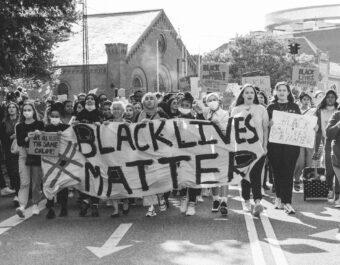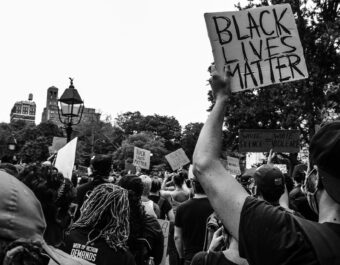News | Background & Goals | Reports | Research Team | Partners | Selected Media
News
Background and Goals
There has been a resurgence of race-related incidents on college campuses in recent years. Overt racism, hate crimes, controversies over free speech and violence continue to occur on college campuses. Such incidents may impact the overall campus racial climate and result in a racial crisis, which is marked by extreme tension and instability. How institutional leaders and the campus community respond to a racial crisis can have as much of an effect as the crisis itself.
In Fall 2015, the University of Missouri—Columbia (MU) experienced a highly publicized racial crisis. Protests in response to cuts to graduate student health insurance catalyzed a movement for larger demands related to racial climate and the needs of students of color. The university response at the time contributed to further conflict, and resulted in the resignation of then-president Tim Wolfe.
The University of Missouri system began a series of changes including hiring new leadership and creating an Office of Diversity, Equity, and Inclusion. Beyond being a media spectacle, what can be learned from this incident?
In 2017, researchers from the Pullias Center and the University of Maryland began a collaborative multi-year project with ACE and the University of Missouri system. The longitudinal case study is capturing in real time how leadership, policy, and programmatic interventions are moving MU forward from the 2015 racial crisis.
The overarching goals for the project are to generate effective strategies that institutional leaders can adopt to respond to and prevent campus racial crises. By sharing the lessons learned from an in-depth study of one university, the project provides insight into how building capacity so racial equity is actually achieved.
The project’s first report, Speaking Truth and Acting with Integrity: Confronting Challenges of Campus Racial Climate (2018), explores what led to MU’s 2015-16 racial crisis and how the institution has since responded, offering recommendations to college and university leaders who strive to create and maintain a positive racial climate on campus. The report includes a trauma-based recovery framework, which can be used to inform post-crisis responses. Future work will demonstrate how campuses are improving their capacity for diversity and inclusion.
This project provides practical tools that leaders can draw on to inform sustainable diversity and inclusion-focused practices and policies on college campuses. The implications of this research are far-reaching and can be used to inform sexual assault and harassment, transgender discrimination and many other campus climate issues that are on the forefront of leaders minds.
Reports
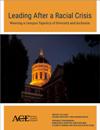
Leading After a Racial Crisis: Weaving a Campus Tapestry of Diversity and Inclusion
Sharon Fries-Britt and Adrianna Kezar (2020)
A report on a research exploring University of Missouri’s progress with diversity, equity, and inclusion in the years following the 2015-16 racial crisis on campus.
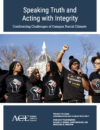
Speaking Truth and Acting with Integrity: Confronting Challenges of Campus Racial Climate
Adrianna Kezar and Sharon Fries-Britt (2018)
Confronting Challenges of Campus Racial Climate is a multi-year study focused on responses to campus racial crises and building institutional capacity for racial equity. The study is a collaboration between the Pullias Center, the American Council on Education (ACE), and the University of Missouri.
This report explores what led to the University of Missouri’s 2015-16 racial crisis and how the institution has since responded, offering recommendations to college and university leaders who strive to create and maintain a positive racial climate on campus. Note: This document is hosted on the ACE website.
Categories: Institutional Culture, Student Success
ACE administrator adrianna kezar DEI diversity institutional change institutional culture leadership lorelle espinosa student success
Download 1.39 MB 17482 Downloads
Research Team

Adrianna Kezar
Director
Lorelle L. Espinosa
Program Director, Alfred P. Sloan Foundation
Jude Paul Matias Dizon
Research Assistant
Marissiko Wheaton
Research Assistant
Partners
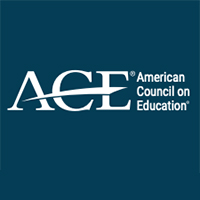 American Council on Education (ACE), the major coordinating body for the nation’s colleges and universities, is a membership organization that mobilizes the higher education community to shape effective public policy and foster innovative, high-quality practice.
American Council on Education (ACE), the major coordinating body for the nation’s colleges and universities, is a membership organization that mobilizes the higher education community to shape effective public policy and foster innovative, high-quality practice.
 The Division of Inclusion, Diversity and Equity for the University of Missouri–Columbia, the Office of Diversity, Equity and Inclusion for the University of Missouri System and the larger University of Missouri community are active collaborators on this project.
The Division of Inclusion, Diversity and Equity for the University of Missouri–Columbia, the Office of Diversity, Equity and Inclusion for the University of Missouri System and the larger University of Missouri community are active collaborators on this project.
Selected Media
 The Chronicle of Higher Education
The Chronicle of Higher Education
Nov. 13, 2018
Colleges Can Recover From Racial Crisis by Taking a Lesson From Mizzou
 Inside Higher Ed
Inside Higher Ed
Nov. 13, 2018
Lessons From Racial Tensions at Missouri
 Diverse Education
Diverse Education
Nov. 13, 2018
ACE Study Outlines Best Practices in Campus Racial Crises
 Politico
Politico
June 3, 2018
Lessons learned from Mizzou’s unrest
 Education Dive
Education Dive
Nov. 13, 2018
Report: How colleges can better respond to racism on campus
Confronting Challenges of Campus Racial Climate

